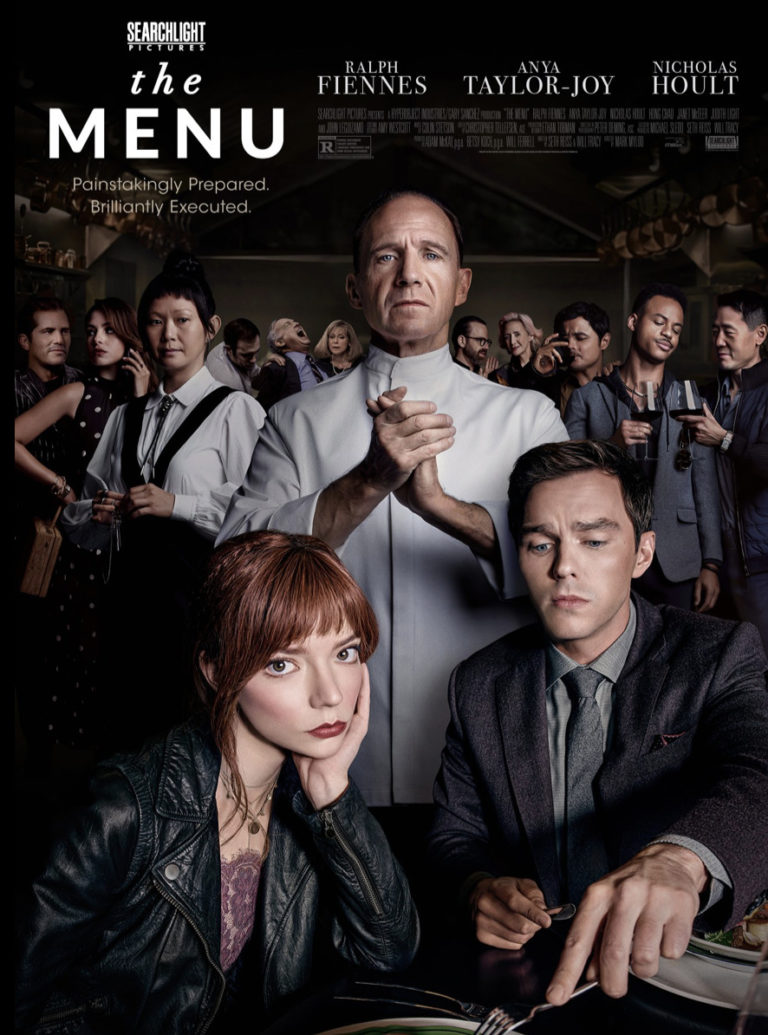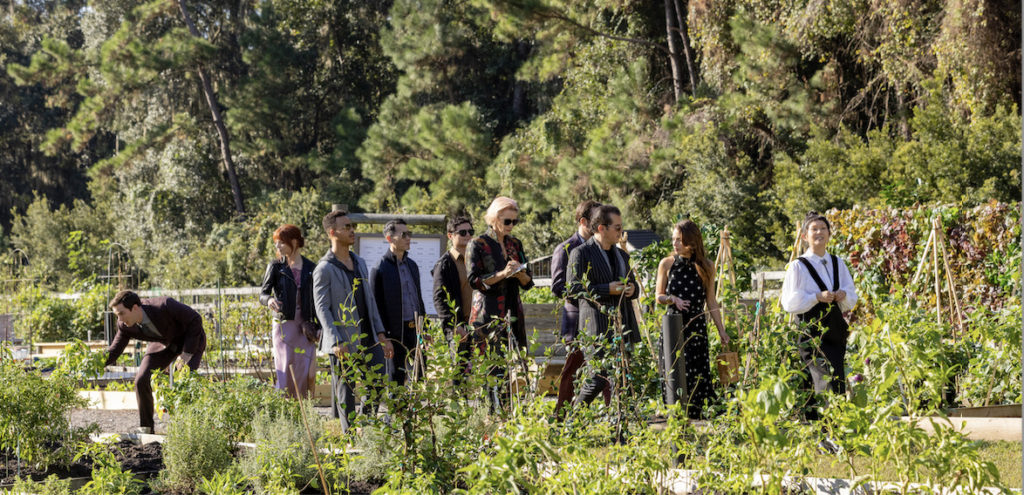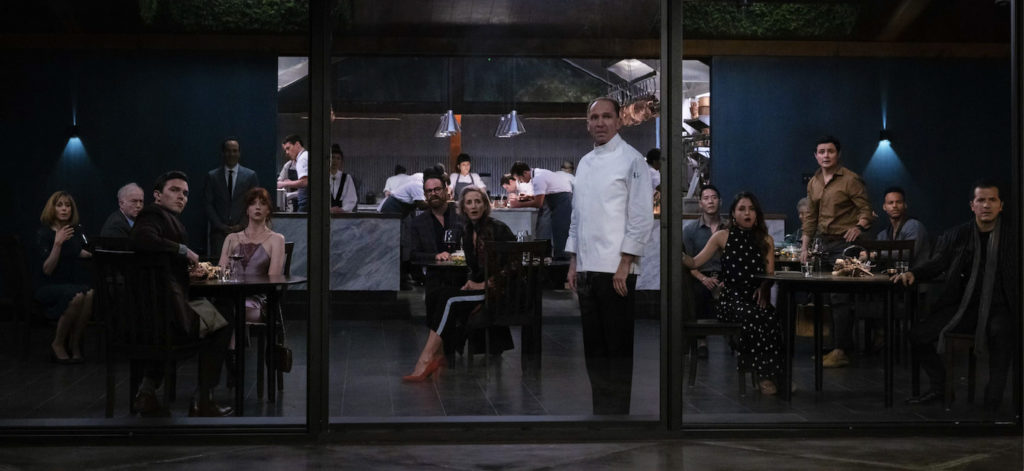
Q: Writers Will Tracy and Seth Reiss made an incredibly engaging script. What triggered you to join this film, and what element did you find fascinating about this script?
JL: There were several things that pulled me to really want to choose to do this. One of them, of course, was Mark Mylod — I am a huge fan of his work as a director.
I am very compelled by the human dynamics, and what makes people have to be on the A-list. What makes people have to be in the number one restaurant in the world? What is it that you feel inside of you that has to claim that kind of experience superiority? What makes you, as a human being, have to do that? So I was really compelled by that dynamic.
Also the different dynamics, and particularly between Reed Birney and myself. What is a marriage that looks like our marriage, and the secrets that we keep from each other? How do we relate to each other? Is there ever a rapprochement beteeen these two people? How do they live their lives in quiet desperation, never being able to connect, never reaching out to each other? So the sorrow of that was very profound to me.
Also, I’m a big foodie. I’m a cook, my husband’s a cook, we had a restaurant in Aspen, Colorado. It’s one of those things that — I have Gourmet magazine, I believe from 1976, until they shut down several years ago. I have Bon Appetit magazine. I have all that stuff. If you come to our house and you see, I have shelves and shelves and shelves of cookbooks.
I’m fascinated by that — by the chemistry of cooking, by the joy of giving to other people, and that’s always been a big thing for me. It always was when I was growing up in my family. I come from a family of female cooks.
Q: Dominique Clemm is the first woman chef in America to get three Michelin stars, and she brought her signature touch to this film. Talk about working with her and watching her work with those wonderful dishes.
JL: The experience of her is watching a great artist. And this is hyperbolic in its own way, but there’s some sense of it that’s accurate, which is like, a Michelangelo. It’s a — well, let me use a female artist, like a Mary Cassatt. There’s a kind of beauty and simplicity and centeredness, and a very Zen quality that she carries within her, where she is the creation. She is not “doing” the food, she is the “being” of the food.
That sounds sortof lofty. I don’t mean it to be that way, but it’s the experience of being around her and being with her, and her generosity of spirit and her kindness, her thoughtfulness, her willingness to engage, her willingness to talk to us about how these things would be made, or what would be made. That was a very exciting part of being in the film, and getting to work with her.
Q: You’ve had a great career with TV shows like “One Life to Live”, “Who’s the Boss?” and “Transparent”, and you won a couple of Tony and Emmy awards. You really have a career that a lot of actresses admire. What quality, what essential element do you look for in a new project?
JL: I look for the elements of a character that’s well-written, of course, like this film. This film is beautifully created. I look to see what I can bring, how I can serve a piece. Do I connect with the character in a way? Can I find something in myself and my life — I tend to believe that things come to us for things that we need to look at in our own lives. So I look for connection, I look for layers.
I’m doing a character on a show right now for Starz called “Shining Vale”. It’s a comedy-drama-horror show. But I don’t mean it’s a “horror show”. I mean it’s a show that has horror in it. It’s about a woman who’s dealing with mental illness. Somehow that struck a real chord for me and it’s something that I wanted to be able to talk about in the publicity that we’re doing.
I’m also doing a character on a show for HBO Max called “Julia” about Julia Child. The character that I’m playing is one of the most famous women publishers, her name is Blanche Knopf. Nobody really knows about her.
So I look for something that’s not been seen before. I look for character development. I look for possible transformation in a character’s life as I’m going through the dynamics of the story. I’m always on the lookout for something like that. It has to carry something particulsr for meto respond to it.
And also the people that I work with. With this movie, we’re working with some of the most special people, talents, in our business: Ralph [Fiennes], Anya [Taylor-Joy], and Mark Mylod, and my friend Reed Birney. I’m always looking for who’s on the team, who am I playing with.

Q: This film reminds one of some of the films of Robert Altman — very natural, very spontaneous. The way Mark depicted a restaurant is very well-crafted. How did you find working with Mark?
JL: Like no one else. He’s like no one else that I’ve had the good fortune to work with. He is supportive, he’s generous, he listens — he hears you. He expects not only professionalism, but you to bring everything you have to the table. He has a willingness to hear you when you throw out all kinds of ideas, and he will say “I want that color and that color” — because we’re all painting, making a piece of art painting together. So you’re always a part of it, in my experience for him. It’s not just him directing you or being the main person. He allows you your own creativity and he melds with that.
One of the things that was really so interesting to me was that he said “I want everyone there all the time when we’re shooting this film.” And I thought, What? I don’t understand that. I don’t understand what he’s looking for, looking at.
Usually when you do a film, sometimes you see somebody in the beginning of the film, or you never see them. Somebody told me I’m in a film with Orlando Bloom and I never saw him. To know you don’t have that. He wanted all of us there all of the time so that he could be shooting pieces and reactions, and using whatever he needed to use.
I was enthralled with that experience. I didn’t think I would be. But it was like being in a play. It was as though you were in the theatre and you were all doing a play, eight shows a week. And that was the experience. That’s the way he meshef and molded, and that’s what you see in the final experience of the film. You see that’s a film about everyone, distinct and separate from each other, but also as a whole entity. It’s genius. It’s genius.
Q: Ralph Fiennes’ character is very quirky, elegant, and a perfectionist, but at the same time very isolated, living alone in that house. What was it like working with Ralph?
JL: Nobody like him. There is nobody like him. He comes completely prepared, having worked — remember, he is theatre actor. He comes from the theatre, and when you work in the theatre a lot, as many of us on this particular shoot have done, you bring a kind of work ethic that might be different than if you were just doing television. Or if you’re the kind of actor, not just in television, who works like that. And everybody on the set whether or not they did theatre works like that.
That goes back to talking about Mark. Mark expected that of us. He held that as a context for the way that we were to be working, and that was important. Ralph understands human psychology. Ralph knows how to place himself within a character that makes your experience of watching him as though he is this person and has lived this person’s life.
That is a very rare and rich quality. It’s the dedication to the work and to the language and to the words — to the specificity of the word, and the specifity of the word becomes the specificity of the character. Also his generosity of spirit, kindness, working with the team, everybody together making the film. That’s the experience of working with him. And I would suspect that that’s what it would be like working with him onstage as well.
Q: If you were a customer at the restaurant, which character would you relate to, other than your own, or who would you want to be?
JL: There are aspects of every single character that I can relate to in every aspect of this film. When that’s available to you, when you see that, when you can know that, all of a sudden that’s what audiences have the potential to see too: that there’s a piece of themselves in every single one of these characters if they look hard enough. You’ll see yourself.
Q: What do you want audiences to take away from this film?
JL: I want them to look at their own need to want to be in the “best” crowd, to be the one who knows everything. The superior one who has to live striving to be in the in-crowd. And the loss that that produces in one’s life by striving for something like that.
Q: Thank you.


